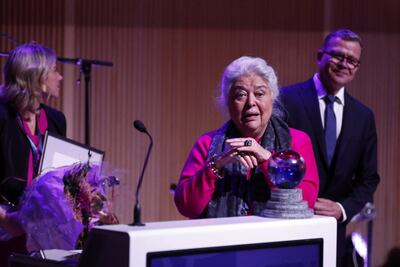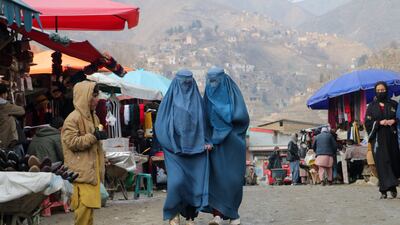I have just returned from Finland where I attended the International Gender Equality Prize in Tampere, a city two hours north of Helsinki.
Finland is a country that has fought hard for the rights of women. It was the first European country to give women the vote, back in 1906, and in 1994 it led the world in making marital rape illegal.
The winner of the prize was Mahbouba Seraj, an elegant 75-year-old Afghan women’s rights activist and Nobel Prize nominee, who runs the last safe shelter for women in Afghanistan and an NGO called Afghan Women Skills Development Centre. Ms Mahbouba gave a stirring and humble speech, pointing out that with the wars raging in Ukraine and Gaza, Afghanistan has very much been forgotten.
The fickleness of world powers to focus on which war matters the most has been something I think about a lot.
Ukraine, which was front page news for nearly two years, may now lose American funding. It has also disappeared from the evening news. I recently visited Kyiv, where the mood is grim – two years of war erodes a country’s emotional psyche, not to mention the civilian fatalities destroying the fabric of society.

Gaza’s desperate humanitarian situation is at the forefront of the agenda – as it should be – but this reminds me very much of how quickly Afghanistan faded from the news after the Taliban gained control in 2021.
When the Taliban came back and the international journalists and aid agencies fled, Ms Mahbouba, unlike then president Ashraf Ghani, chose to stay. She had trained as a historian at Kabul University, and she remained not only out of loyalty for her country, but also to witness what was happening.
She also knew she could help make the country better. She had left Afghanistan before, in 1978, and she remembers the bitterness of being in exile, especially when she knew that her country needed her skills.
Returning in 2003, she worked with women and children in a variety of initiatives. Her work is mainly with young women who are escaping violence or early marriages, and she shelters them and mothers them, giving them a chance at a new life. This means she must sometimes have to engage with the Taliban, including (surprisingly) a bureau of Human Rights in order to get things done.
Perhaps what is so painful for the women of Afghanistan is having achieved so much, only to see it disappear. The decades of freedom for Afghan women after the Taliban fell in November 2001 was exhilarating.
I remember being on the streets of Kabul in those heady days and meeting young women who were opening books and talking about university, travel and freedom. Later, there was an expanse of female entrepreneurs who set out to train and educate women who had been tethered for so long. The pain of seeing two decades of work towards gender equality vanishing has been searing for Ms Mahbouba.
“The lives of Afghan women have changed 180 degrees,” she said. “The women of Afghanistan went from existence – from being part of society, from working, from being part of every aspect of life as doctors, judges, nurses, engineers, women running offices – to nothing.”
The right to go to high school was taken away from them. Women are banned from going to parks, public bathing spaces and gyms. Gender equality virtually vanished, as did their freedom of movement, or as a report by UN Women put it, women in Afghanistan went from “everywhere to nowhere”.
The report stresses that over the past two years, the Taliban have issued 80 edicts, 54 of these directly target women and girls.
“The rollbacks started as soon as they took power in August 2021, when they ordered women to stay at home because their foot soldiers were ‘not familiar with seeing women outside the house and were not trained to respect women’ … it was clear gender segregation and restricting women’s movement remained the cornerstone of their vision for society. The so-called ‘Taliban 2.0’ never eventuated.”
We are now two years into Taliban rule. Women have been stopped from pursuing education beyond the sixth grade. Their ability to work outside of health and education is all but prohibited.
The cumulative effect of the Taliban’s edicts and behaviours has largely been the imprisonment of women within the walls of their homes. But the question that should be asked is: what more can be taken away from them? The potential for them to vanish behind the walls of their homes – as they had in the pre-2001 Taliban rule – is very real.
We should not push Afghanistan to the back of the international agenda, because it is unjust, but also because the reversal of rights should serve as a powerful example.
One point that Ms Mahbouba has made is that if rights can be taken from Afghan women so easily, they can be taken from women anywhere – and that includes the US. “Roe versus Wade”, which is the US Supreme Court ruling for the right to have an abortion, is a striking example. The reversal of the legislation in June 2022 destroyed years of progress by American feminists.
It has meant that women could be forced to backstreet and illegal abortions. It has unfairly targeted women of colour and economically challenged because their resources at finding alternatives are limited.
The point is that it is easy to sit back and accept that we have hard-earned rights that won’t shift. But this is not the case. Gender rights were turned back to Ground Zero in Afghanistan – and it could happen anywhere.
Right-wing governments are on the rise throughout the world. There is a very real chance that Donald Trump will be re-elected in 2024, and if he is, many fundamental human rights will be at stake, perhaps including freedom of press and rule of law.
We should look to the women of Afghanistan as a lesson of what must not happen, and continue to support them, promote them, and try to bring them back into the world.


